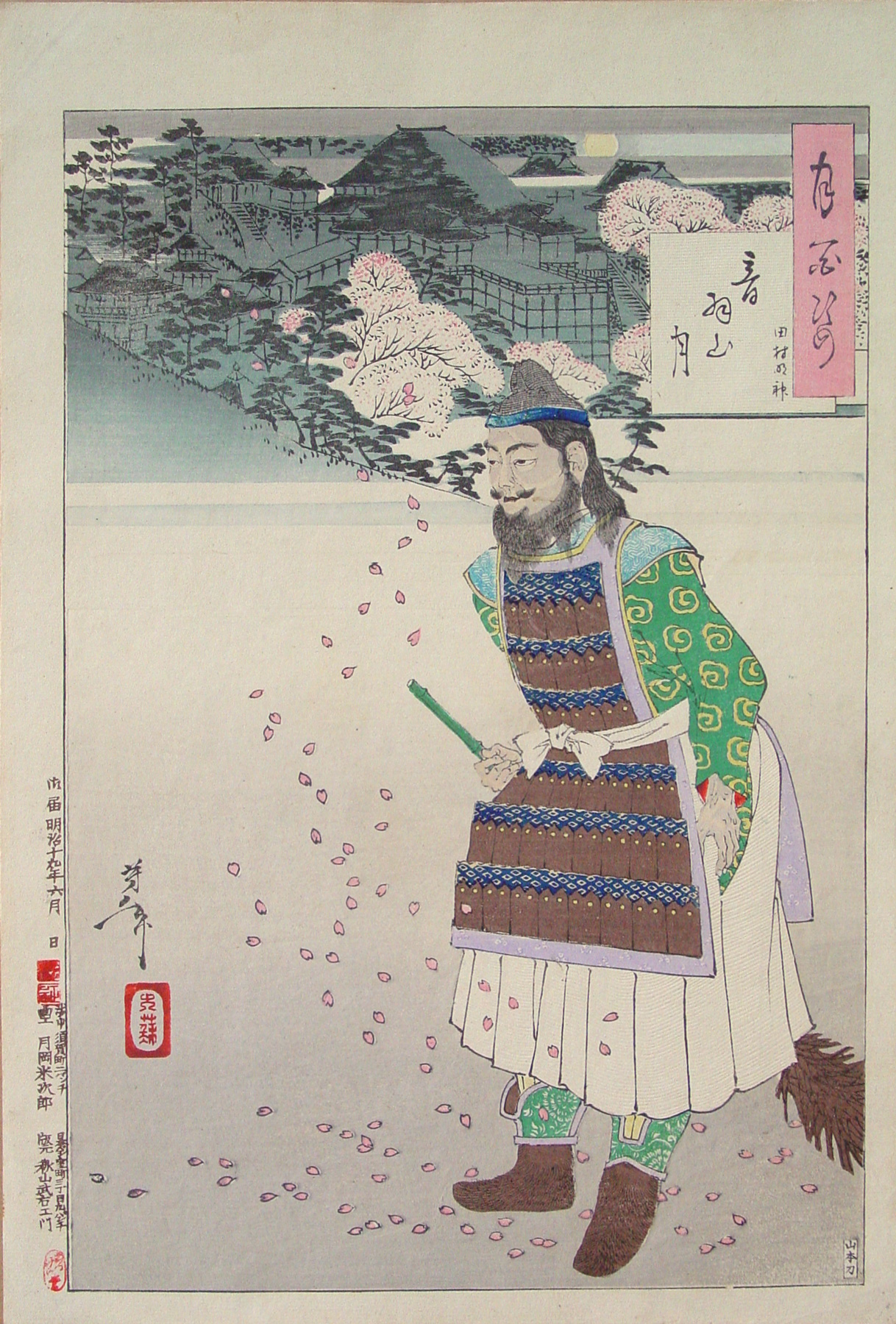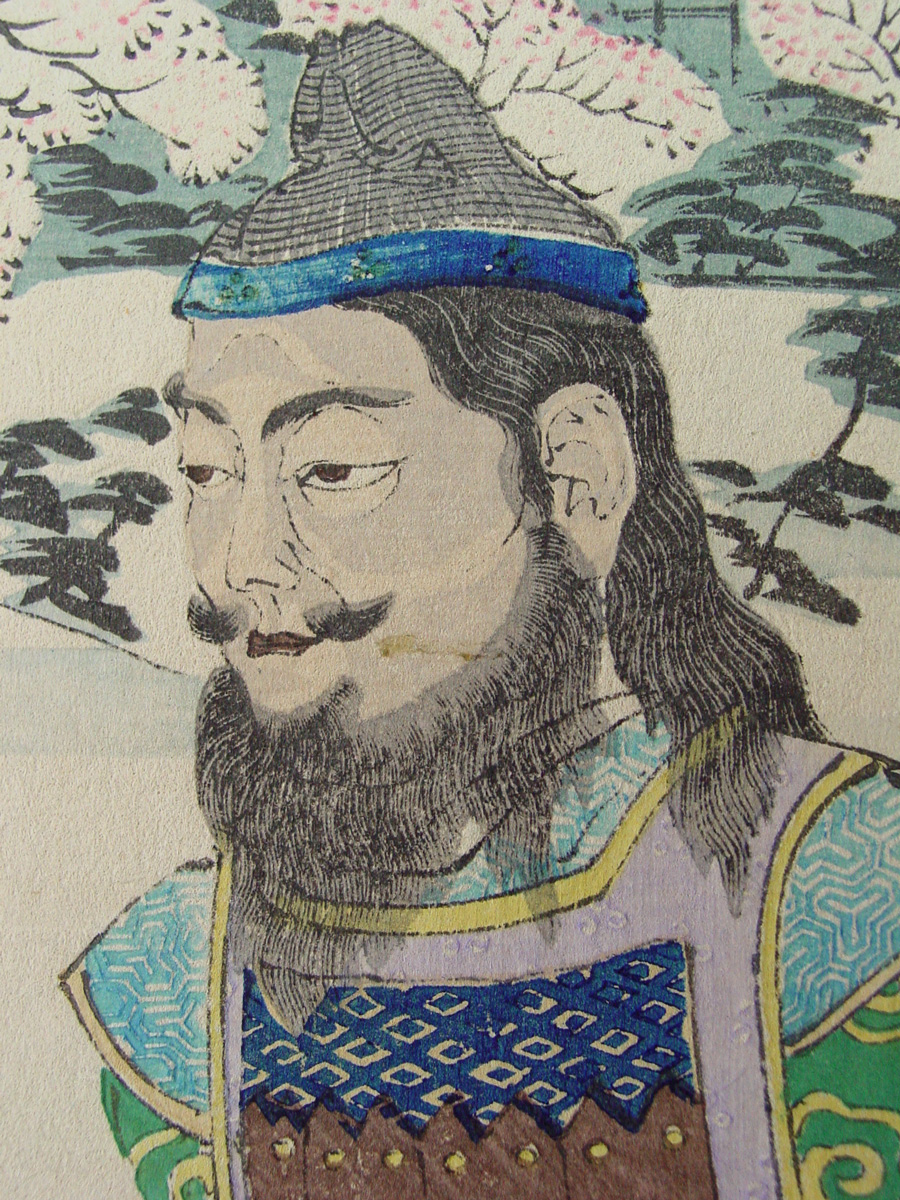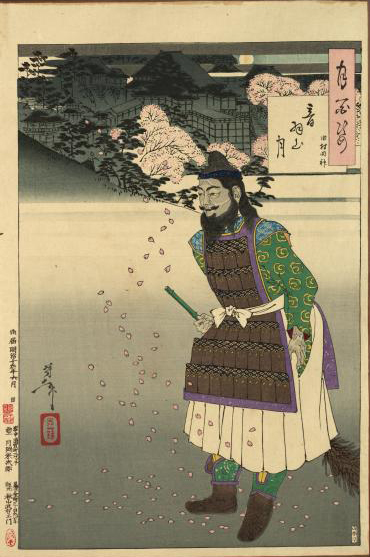About This Print
Source: Museum of International Folk Art http://www.internationalfolkart.org/exhibitions/past/moonweb/section2/054.htm
Based on a scene from a Noh play, three itinerant priests meet a man sweeping fallen cherry petals as they visit Kiyomizu Temple in Kyoto. The man proves to be the spirit of the warrior Tamura Myojin, the deity of the mountain behind the temple.
An early, if not first, state of this print.
The Story Depicted in the Print as Told by John Stevenson
Source: Yoshitoshi's One Hundred Aspects of the Moon, John Stevenson, Hotei Publishing, Netherlands 2001.35.
Mount Otowa Moon - Bright God Tamura
Otowayama no tsuki - Tamura Myojin
Sakanoe no Tamuramaro was a famous general of the later Nara period (710-794). He led several successful campaigns against the Ebisu, a generic name for the aborigines of north and east Japan. Regarded as less than human, even as devils, these primitive tribes were a serious threat to the Nara emperors. When he died in 811, Tamuramaro was deified as the Shinto god Tamura Myojin, Bright God Tamura.
After defeating the Ebisu, Tamura went on a hunting expedition. In the forest a magic stag led him to the hermitage of the monk Enchin, who for twenty years had been carving a huge log into an image of the Buddhist bodhisattva Kannon. Tamura was so impressed by the monk’s devotion that he had his house taken down and rebuilt to protect the image. The site on Mount Otowa in the hills east of Kyoto was made into a shrine, which eventually became the large and influential Kiyomizu temple. Kiyomizu means “clear water,” a reference to the purifying stream that still issues from the site.
This design is taken from a Noh play called Tamura. Three itinerant monks visit the Kiyomizu temple on a moonlit night in spring. A youth appears and begins to sweep away fallen cherry blossoms with a broom. The monks ask him about the history of the temple – he answers briefly and then disappears. A local commoner comes on stage and tells them that the youth must have been the ghost of Sakanoe no Tamuramaro. The travelers stay up all night chanting holy sutras, and as they finish hear the soaring notes of a flute. Another manifestation of Tamura’s ghost, this time in the form of a general, comes on stage. He recounts how he conquered the devils of Ise with the help of the thousand-armed Kannon, who loosed a thousand arrows from a thousand bows to save him from his enemies.
In this print the figure of the ghost appears to be a combination of the boy sweeping cherry blossoms and the old warrior. He wears ancient leather armor, and his face takes the form of a Noh mask. The mask has a ghostly hue, the result of printing a beige pigment over gray. The figure’s neck and hands have the same pallor as the mask. His green tunic bears a design of clouds, and his white kilt is heavily embossed.
Kiyomizu temple is famous for its cherry trees. Temple buildings and flowering trees appear in the background of the print. The site of the temple is spectacular – some of the buildings are constructed on a huge platform that juts out from a hillside overlooking Kyoto, giving a magnificent view.
Otowayama no tsuki - Tamura Myojin
Sakanoe no Tamuramaro was a famous general of the later Nara period (710-794). He led several successful campaigns against the Ebisu, a generic name for the aborigines of north and east Japan. Regarded as less than human, even as devils, these primitive tribes were a serious threat to the Nara emperors. When he died in 811, Tamuramaro was deified as the Shinto god Tamura Myojin, Bright God Tamura.
After defeating the Ebisu, Tamura went on a hunting expedition. In the forest a magic stag led him to the hermitage of the monk Enchin, who for twenty years had been carving a huge log into an image of the Buddhist bodhisattva Kannon. Tamura was so impressed by the monk’s devotion that he had his house taken down and rebuilt to protect the image. The site on Mount Otowa in the hills east of Kyoto was made into a shrine, which eventually became the large and influential Kiyomizu temple. Kiyomizu means “clear water,” a reference to the purifying stream that still issues from the site.
This design is taken from a Noh play called Tamura. Three itinerant monks visit the Kiyomizu temple on a moonlit night in spring. A youth appears and begins to sweep away fallen cherry blossoms with a broom. The monks ask him about the history of the temple – he answers briefly and then disappears. A local commoner comes on stage and tells them that the youth must have been the ghost of Sakanoe no Tamuramaro. The travelers stay up all night chanting holy sutras, and as they finish hear the soaring notes of a flute. Another manifestation of Tamura’s ghost, this time in the form of a general, comes on stage. He recounts how he conquered the devils of Ise with the help of the thousand-armed Kannon, who loosed a thousand arrows from a thousand bows to save him from his enemies.
In this print the figure of the ghost appears to be a combination of the boy sweeping cherry blossoms and the old warrior. He wears ancient leather armor, and his face takes the form of a Noh mask. The mask has a ghostly hue, the result of printing a beige pigment over gray. The figure’s neck and hands have the same pallor as the mask. His green tunic bears a design of clouds, and his white kilt is heavily embossed.
Kiyomizu temple is famous for its cherry trees. Temple buildings and flowering trees appear in the background of the print. The site of the temple is spectacular – some of the buildings are constructed on a huge platform that juts out from a hillside overlooking Kyoto, giving a magnificent view.
About the Series "One Hundred Aspects of the Moon"For details about this series which consists of one hundred prints with the moon as a unifying motif, see the article on this site Yoshitoshi, One Hundred Aspects of the Moon.
Print Details
| IHL Catalog | #53 |
| Title | Mount Otowa Moon - Bright God Tamura (Otowayama no tuski 音羽山月 田村明神) |
| Series | One Hundred Aspects of the Moon (Tsuki hyaku sugata 月百姿) |
| John Stevens Reference No.* | 35 |
| Artist | Tsukioka Yoshitoshi (1839-1892) |
| Signature | Yoshitoshi 芳年 |
| Seal | Taiso 大蘇 |
| Date | June 1886 (御届明治十九年六月 日) |
| Edition | A single sheet issue, not bound into an album. |
| Publisher | Akiyama Buemon (秋山武右エ門) [Marks: seal 26-132; pub. ref. 005] |
| Carver | Yamamoto tō (山本刀) [full name Yamamoto Shinji] |
| Impression | excellent |
| Colors | excellent |
| Condition | excellent - minor toning and soiling; untrimmed; not backed. |
| Genre | ukiyo-e |
| Miscellaneous | |
| Format | oban |
| H x W Paper | 14 5/8 x 9 7/8 in. (37.1 x 25.1 cm) |
| H x W Image | 13 x 8 3/4 in. (33 x 22.2 cm) |
| Collections This Print | New York Public Library Humanities and SocialSciences Library / Spencer Collection; Yale University Art Gallery 2011.143.1.35; Uragami Hagi Museum UO1531; Tokyo Metropolitan Library 加4722-71; The Tsubouchi Memorial Theatre Museum of Waseda University 201-4492; Ritsumeikan University ARC NDL-541-00-059 |
| Reference Literature | * Yoshitoshi’s One Hundred Aspects of the Moon, John Stevenson, Hotei Publishing, Netherlands 2001 |




